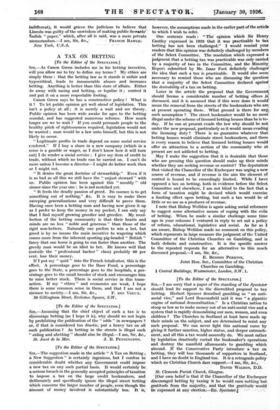A TAX ON BETTING
[To the Editor of the SPECTATOR.] SIR,—As Canon Green includes me in - his betting invectiVe, will you allow me to 'try to define my terms ? My ethics are simply these : that the betting law as it stands is unfair 'and hypocritical, leads to innumerable abuses and increases betting. Anything is better than this state of affairs. Either do away with racing and betting, or legalize it ; control it and put it on a more respectable footing.
Canon Green says he has a constructive policy ! What is
it ? To let public opinion get well ahead of legislation. This isn't a policy at all ; it is merely a wait and see theory. Public opinion has been wide awake for ages to the betting scandal, and has suggested numerous reforms. How much longer are we to wait ? If you could persuade people to the healthy pitch of righteousness required, legislation would not be wanted ; man Would be a law unto himself, but this is not likely ,tó. occur.
"Legitimate profits in trade depend on some social service rendered." If I buy a share in a new company (which' in'a sense is a gamble or wager, as I don't know how it will turn out) I do render a Social service ; I give my item of credit to trade, without which no trade can be carried On. I can't do more unless I become a director—I might do better work then or I might not.
"It denies the great doctrine of stewardship." Even if it is as bad as all this we still have the "unjust steward" with us. Public opinion has been against this "mouldy " old sinner since the year one : he is not scotched yet.
"It feeds the deadly passion of greed. Its essence is to get something out of nothing," , &c. It is easy to make these sweeping generalizations and very difficult to prove them. Having once been a betting man and having now given it lip as I prefer to keep the money in my pocket, I can only say that I find myself growing greedier and greedier. My recol- lection of the betting community is that their hearts and minds are no less "noble and generous than those of the rigid non-betters. Naturally one prefers to win a bet, but greed is by no means the main incentive to wagering which comes more from the inherent sporting pig-headed " British" fancy that one horse is going to run faster than another. ,The greedy man would be an idiot to bet. He knows well that (outside the "professional backer" class) probably 80 per cent, lose their money.
If! Put my " quid" into the Vrench totalisator, this is the effect. A percentage goes' to the Race -Fimd, a percentage goes to the State, a percentage goes to the hospitals, a per- centage goes to the small breeder of stock and encourages him to raise better stock. There is soda' service in this trans- action. If my " ethics " and economics are weak, I hope there is some common sense in them, and that I am not a . .


















































 Previous page
Previous page